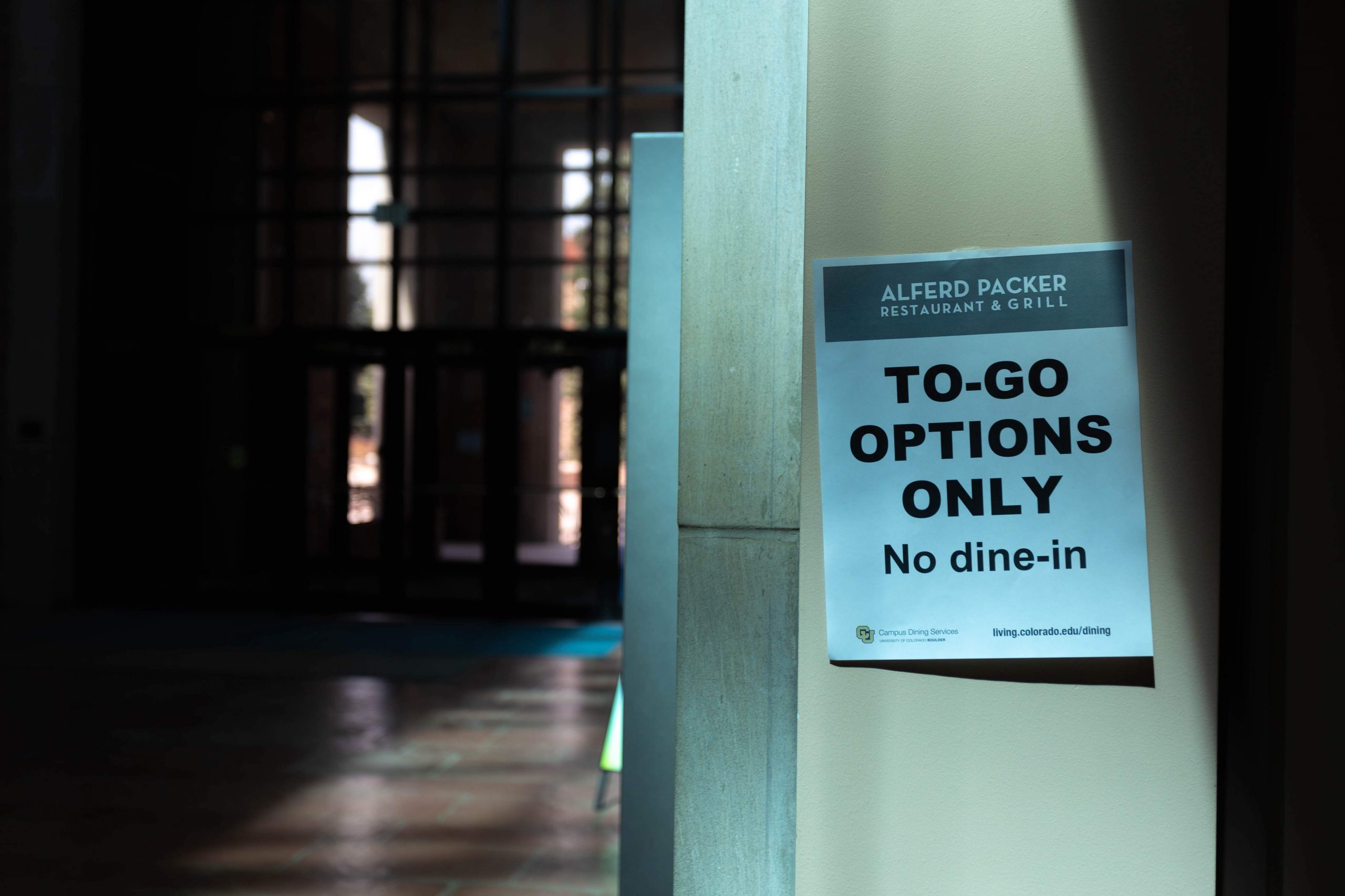
In response to COVID-19, campus Housing and Dining Services has implemented a to go option only for all dining areas including the Alfred Packer Grill. March 17, 2020 (Kevin Wu/CU Independent)
With an order for Boulder residents to stay at home in a bid to slow the spread of the novel coronavirus, some University of Colorado Boulder students’ anxiety is increasing as they wonder where to eat.
“I was still eating at the dining hall, but towards the end with all of the dining hall changes I started to eat at regular restaurants,” said first-year student Andrew Lee.
While CU Boulder has yet to fully close its main campus dining halls including the Center for Community (C4C) and University Memorial Center, it has ceased to offer students dine-in options, instead offering Grab-n-Go food only. It has also restricted the facility’s hours in order to mitigate the number of students coming in and out.
With CU Boulder Chancellor Philip DiStefano’s call for students to leave their campus housing if they can, many have returned home. But even after leaving his dorm, Lee said he returned to campus to use his meal plan for food.
“I was a little worried, but I still ate (at the C4C) the following day just because I had trust that they would take the right steps to clean and sanitize everything,” Lee said.
While some students said they were turning to more restaurants, the constrictions on the food industry have shaken employment.
CU Boulder student Sidney Harvey has been left in uncertainty after Right Wing Pizza, her place of work, temporarily closed due to the pandemic. The restaurant will remain shut for at least 30 days. It could still be longer than that before Harvey returns to work.
“I was looking at getting a new job, but very few businesses are hiring, especially dance studios and restaurants which is where all of my expertise is in,” Harvey said.
And it’s affecting her own food regimen.
“I’m used to eating very consistently. With everything that is happening I’m going to need to adjust to a new diet,” Harvey said.
But local agencies, including non-profits, are stepping in to meet the needs of a growing number of people unemployed and in need of food relief.
The Emergency Family Assistance Association (EFAA), a non-profit organization in Boulder, said it has been closely following COVID-19 and is providing updates for retail food establishments. While the EFAA “is prepared to continue to provide services” according to its website, all appointments made will be conducted over the phone.
According to EFAA Executive Director Julie Van Domelen, the service has seen an uptake in people needing help within the past weeks.
“There are more and more impacted by loss of jobs and loss of childcare,” Van Domelen said. “It’s hard to go to work when schools are closed. We are getting people that are calling in that have never needed services, just got laid off, or don’t have the right food.”
EFAA’s food bank, located at 1575 Yarmouth Ave, is temporarily closed but grab-and-go food bags are available to be picked up at the main office during regular business hours. Even with the city of Boulder’s shelter in place order, EFAA said it will continue to provide services.
“Food banks are considered essential services, along with grocery stores, so we will continue to operate,” Van Domelen said.
But the association has already faced several curveballs with the pandemic.
“Because of the nature of this crisis, it changes operations completely. We have hundreds of people coming through every week,” Van Domelen said. “It’s a challenge working with vegetables and perishables versus non-perishables. We have also moved the rest of the staff now to working remotely.”
Van Domelen said EFAA staff is asking for community help and is accepting donations of non-perishables in particular.
“If you have the ability, give,” Van Domelen said. “We all have a role to play.”
And of course, toilet paper is always welcomed.
“If anyone is wild and has six months’ worth of toilet paper, please let us know,” Van Domelen said.
Contact CU Independent Staff Writer Dawson Drew at dawson.drew@colorado.edu.
